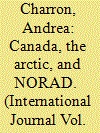|
|
|
Sort Order |
|
|
|
Items / Page
|
|
|
|
|
|
|
| Srl | Item |
| 1 |
ID:
121224


|
|
|
|
|
| Publication |
2012.
|
| Summary/Abstract |
The Arctic Council is a high-level, mainly intergovernmental forum for
cooperation, coordination, and interaction among Arctic states,1
indigenous
groups, and interested parties of two issue areas, sustainable development in
the Arctic and the protection and study of the fragile Arctic ecosystem. The
council is poorly understood and little advertised. And while it cannot enact
binding legislation (except among the member states) or discuss issues of
military security, these supposed "weaknesses" have actually helped to forge
consensus in other important issue areas.
|
|
|
|
|
|
|
|
|
|
|
|
|
|
|
|
| 2 |
ID:
138286


|
|
|
|
|
| Summary/Abstract |
The Arctic is perceived as an area that requires increased North American Aerospace Defense Command (NORAD) attention. On the one hand, the region has always been of particular concern to NORAD, especially during the Cold War. From this perspective, attention to the Arctic is business as usual. On the other hand, increased potential traffic in the region due to warmer temperatures, natural resource exploitation, and tourism could increase threats to North America and create the need for a new NORAD posture. This paper reviews the challenges facing the Arctic, the perceived new urgency for attention, the command and control structures of NORAD, and NORAD’s specific preoccupations in order to answer the question: does the Arctic represent status quo for NORAD or does NORAD need to change, fundamentally, its approach to the North? This paper ultimately argues for the former.
|
|
|
|
|
|
|
|
|
|
|
|
|
|
|
|
| 3 |
ID:
097085


|
|
|
| 4 |
ID:
142432


|
|
|
| 5 |
ID:
107032


|
|
|
|
|
| Publication |
London, Routledge, 2011.
|
| Description |
xvii, 226p.
|
| Series |
Routledge security and conflict management
|
| Standard Number |
9780415598354. hbk
|
|
|
|
|
|
|
|
|
|
|
|
Copies: C:1/I:0,R:0,Q:0
Circulation
| Accession# | Call# | Current Location | Status | Policy | Location |
| 056187 | 341.582/CHA 056187 | Main | On Shelf | General | |
|
|
|
|
| 6 |
ID:
142435


|
|
|
|
|
| Summary/Abstract |
Sanctions are frequently applied by the UN Security Council (UNSC) as well as regional organizations. While the objectives sought often vary, a frequent commonality is that they target African states. Indeed, Africa is the most frequently targeted continent by the UNSC and regional organisations including the African Union, Economic Community of West African States and the European Union. However, little attention has been paid to the confluence of this sanctions activity by these different organizations. This article seeks to address this gap in the research. While the UNSC continues to focus on sanctioning to end hostilities, the regional organizations have assigned themselves unconstitutional changes to government as the principal reason to sanction African states. Drawing on data from the Targeted Sanctions Consortium (TSC), this article suggests that: 1) regional organisations are leading UNSC activity more often than is appreciated in the literature; 2) the UNSC has of late been expanding its sanctioning activity to consider issues of democracy and good governance; 3) the UNSC uses sanctions to endorse the activity of African regional organizations to deal with crises on the continent; and 4) UNSC and regional sanctions are intimately tied to crisis management in Africa.
|
|
|
|
|
|
|
|
|
|
|
|
|
|
|
|
|
|
|
|
|